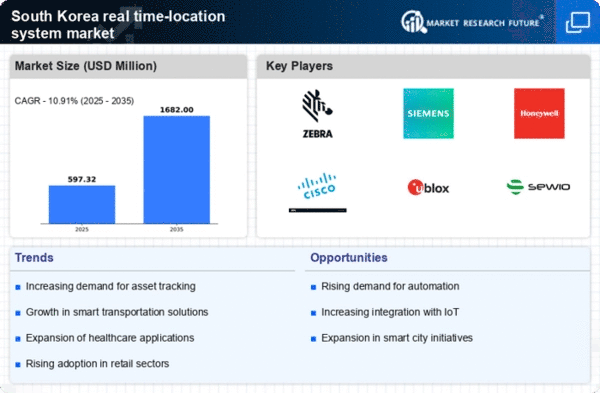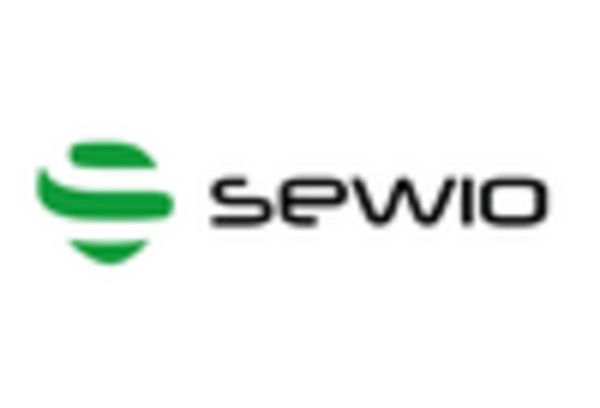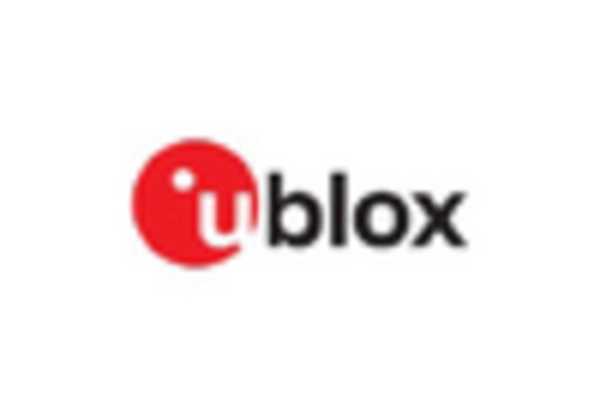Technological Advancements in IoT
Technological advancements in the Internet of Things (IoT) are significantly influencing the real time-location-system market in South Korea. The proliferation of IoT devices enables seamless integration of location-based services into various applications, enhancing their functionality and effectiveness. As IoT technology continues to evolve, the capabilities of real time-location systems are expected to expand, offering more precise tracking and analytics. This evolution is likely to attract investments from various sectors, including logistics, healthcare, and retail, as organizations seek to leverage IoT-enabled solutions for improved operational efficiency. The market is projected to witness a growth rate of around 12% annually, driven by the increasing adoption of IoT technologies.
Government Initiatives and Support
Government initiatives in South Korea play a pivotal role in fostering the growth of the real time-location-system market. The South Korean government has been actively promoting smart technologies and digital transformation across various sectors. Initiatives aimed at enhancing public safety, transportation efficiency, and urban planning are likely to drive the adoption of real time-location systems. For instance, the government has allocated substantial funding for smart city projects, which often incorporate location-based services. This support not only encourages private sector investment but also creates a conducive environment for innovation in the real time-location-system market, potentially leading to a more integrated and efficient urban infrastructure.
Surge in Demand for Asset Tracking
The real time-location-system market in South Korea experiences a notable surge in demand for asset tracking solutions across various sectors. Industries such as manufacturing, healthcare, and retail are increasingly adopting these systems to enhance operational efficiency and reduce losses. According to recent data, the asset tracking segment is projected to grow at a CAGR of approximately 15% over the next five years. This growth is driven by the need for real-time visibility of assets, which helps organizations optimize inventory management and improve supply chain processes. As businesses recognize the value of precise asset tracking, investments in real time-location-system technologies are likely to escalate, further propelling market expansion.
Growing Awareness of Safety and Security
The growing awareness of safety and security concerns among businesses and consumers is a significant driver for the real time-location-system market in South Korea. Organizations are increasingly recognizing the importance of safeguarding assets and ensuring the safety of personnel, particularly in high-risk environments. This heightened awareness is prompting investments in real time-location systems that offer features such as geofencing and emergency alerts. As a result, the market is likely to see a rise in demand for solutions that enhance situational awareness and enable rapid response to incidents. Industry reports suggest that the safety and security segment within the real time-location-system market could grow by approximately 18% over the next few years, reflecting the critical need for enhanced protective measures.
Rising Need for Enhanced Customer Experience
In the competitive landscape of South Korea, businesses are increasingly focusing on enhancing customer experience, which significantly impacts the real time-location-system market. Companies are leveraging location-based services to provide personalized experiences, such as targeted promotions and real-time updates on service availability. This trend is particularly evident in the retail and hospitality sectors, where customer satisfaction is paramount. As organizations strive to meet evolving consumer expectations, the integration of real time-location systems is likely to become a strategic priority. Market analysis indicates that businesses investing in these technologies can expect to see a potential increase in customer retention rates by up to 20%, underscoring the importance of location intelligence in driving customer loyalty.
















